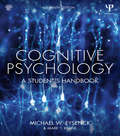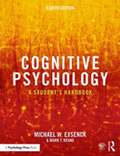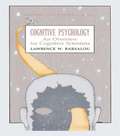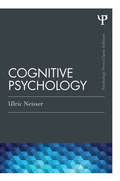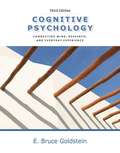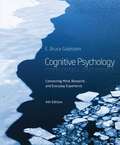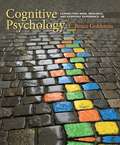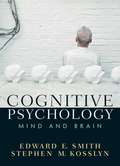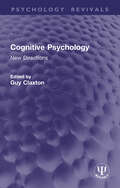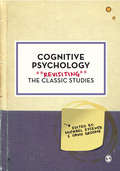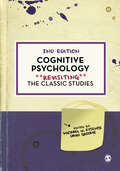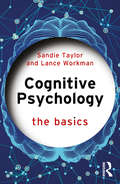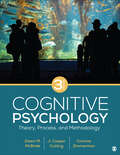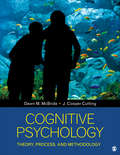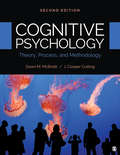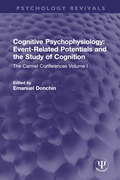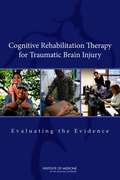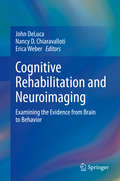- Table View
- List View
Cognitive Psychology: A Student's Handbook
by Michael Eysenck Mark KeaneRigorously researched and accessibly written, Cognitive Psychology: A Student's Handbook is widely regarded as the leading undergraduate textbook in the field. The book is clearly organised, and offers comprehensive coverage of all the key areas of cognitive psychology. With a strong focus on considering human cognition in context, the book has been designed to help students develop a thorough understanding of the fundamentals of cognitive psychology, providing them with detailed knowledge of the very latest advances in the field. New to this edition: Thoroughly revised throughout to include the latest research and developments in the field Extended coverage of cognitive neuroscience Additional content on computational cognitive science New and updated case studies demonstrating real life applications of cognitive psychology Fully updated companion website Cognitive Psychology: A Student's Handbook will be essential reading for all undergraduate students of psychology. Those taking courses in computer science, education, linguistics, physiology, and medicine will also find it an invaluable resource.
Cognitive Psychology: A Student's Handbook
by Michael W. Eysenck Mark T. KeaneThe fully updated eighth edition of Cognitive Psychology: A Student's Handbook provides comprehensive yet accessible coverage of all the key areas in the field ranging from visual perception and attention, through to memory and language.
Cognitive Psychology: An Anthology of Theories, Applications, and Readings
by Jeffrey AnastasiCognitive Psychology: An Anthology of Theories, Applications and Readings exposes students to the unique and influential viewpoints of authors and scholars who are currently conducting research related to cognition. <p><p>The essays and readings introduce readers to a broad spectrum of topics related to cognitive psychology to provide them with a strong, foundational knowledge of current theories, applications, and attitudes. The text begins with an overview of the field of cognitive psychology, as well as a discussion of its history. In later chapters, readings regarding cognitive neuroscience, perceptual processes, attention and consciousness, and repressed and false memories are presented. <p><p>Students learn about language acquisitions in humans, animal communication and language, judgment and reasoning, human factors in engineering and performance, and more.
Cognitive Psychology: An Overview for Cognitive Scientists (Tutorial Essays in Cognitive Science Series)
by Lawrence W. BarsalouThis text presents the basic concepts of modern cognitive psychology in a succinct and accessible manner. Empirical results, theoretical developments, and current issues are woven around basic concepts to produce coherent accounts of research areas. Barsalou's primary goal is to equip readers with a conceptual vocabulary that acquaints them with the general approach of cognitive psychology and allows them to follow more technical discussions elsewhere. In meeting this goal, he discusses the traditional work central to modern thinking and reviews current work relevant to cognitive science. Besides focusing on research and theory in cognitive psychology, Barsalou also addresses its fundamental assumptions. Because the cognitive approach to psychology is somewhat subtle, often misunderstood, and sometimes controversial, it is essential for a text on cognitive psychology to address the assumptions that underlie it. Therefore, three of the eleven chapters address the "meta- assumptions" that govern research and theory in cognitive psychology. These meta-chapters provide a deeper understanding of the content areas and a clearer vision of what cognitive psychologists are trying to accomplish. The remaining eight "content" chapters cover the central topics in cognitive psychology. This book will be of value to a variety of audiences. Ideal for researchers in computer science, linguistics, philosophy, anthropology, and neuroscience who wish to acquaint themselves with cognitive psychology, it may also be used as a text for courses in cognitive science and cognitive psychology. Lay readers who wish to learn about the cognitive approach to scientific psychology will also find the volume useful.
Cognitive Psychology: Classic Edition (Psychology Press & Routledge Classic Editions)
by Ulric NeisserFirst published in 1967, this seminal volume by Ulric Neisser was the first attempt at a comprehensive and accessible survey of Cognitive Psychology; as such, it provided the field with its first true textbook. Its chapters are organized so that they began with stimulus information that came 'inward' through the organs of sense, through its many transformations and reconstructions, and finally through to its eventual use in thought and memory. The volume inspired numerous students enter the field of cognitive psychology and some of the today's leading and most respected cognitive psychologists cite Neisser's book as the reason they embarked on their careers.
Cognitive Psychology: Connecting Mind, Research and Everyday Experience (3rd Edition)
by E. Bruce GoldsteinBruce Goldstein's COGNITIVE PSYCHOLOGY connects the study of cognition to your everyday life. This accessible book introduces you to landmark studies as well as the cutting-edge research that define this fascinating field. To help you further experiment with and understand the concepts in the text, you can use COGLAB 2. 0: THE ONLINE COGNITIVE PSYCHOLOGY LABORATORY. Available at www. iChapters. com, COGLAB contains dozens of classic experiments designed to help you learn about cognitive concepts and how the mind works.
Cognitive Psychology: Connecting Mind, Research and Everyday Experience (Fourth Edition)
by E. Bruce GoldsteinBruce Goldstein's COGNITIVE PSYCHOLOGY: CONNECTING MIND, RESEARCH, AND EVERYDAY EXPERIENCE connects the study of cognition to your everyday life. A wealth of concrete examples and illustrations help you understand the theories of cognition-driving home both the scientific importance of the theories and their relevance to your daily life. This accessible book introduces you to landmark studies and cutting-edge research that define this fascinating field.
Cognitive Psychology: Connecting Mind, Research, and Everyday Experience
by E. Bruce GoldsteinA lot goes on in your head when you're doing something simple like remembering (or forgetting!) to do your next assignment. Bruce Goldstein explains all this activity going on in your mind in Cognitive Psychology: Connecting Mind, Research, and Everyday Experience. Concrete examples and illustrations help you understand both the scientific importance of theories and their relevance to you, including research-based suggestions for better ways to study. MindTap brings the experiments to life with interactive demos and CogLab: The Online Cognition Lab. You can participate in experiments as a subject and experience the effects of the demonstrations yourself to learn how the mind works.
Cognitive Psychology: Mind and Brain
by Stephen M. Kosslyn Edward E. SmithThis textbook is the first to incorporate neuroscience seamlessly into the study of cognitive psychology. The study of cognition has progressed enormously over the past decade, but no currently available book summarizes and makes accessible the key findings and theories. This book takes a fresh look at the field, and presents it as it actually is today. By integrating findings about the brain into the usual fare for this topic, it provides the foundation for readers to study current research in the field. How the Brain Gives Rise to the Mind; Perception; Attention; Representation and Knowledge in Long-Term Memory; Encoding and Retrieval from Long-Term Memory; Working Memory; Executive Processes; Emotion and Cognition; Decision Making; Problem Solving and Reasoning; Planning and Motor Cognition; and Language. For those practicing in the field of cognitive psychology.
Cognitive Psychology: New Directions (Psychology Revivals)
by Guy ClaxtonOriginally published in 1980, this title was designed to present key topics in cognitive psychology to university and college students in a way that drew out the main ideas behind those topics, this book also shows how these ideas were likely to develop over the following years. Its special characteristics are its efforts to anticipate the most fruitful lines of development and to integrate a number of different authors’ opinions about where the strengths and weaknesses of cognitive psychology lie. At the time the contributors were in the main younger lecturers in cognitive psychology who were, through their own research, actively engaged in bringing new directions into being.The volume will still be of interest to cognitive psychologists in general who wish to reflect on what the field was, and who are concerned about the conceptual and methodological growth points in the discipline. In addition to chapters with familiar headings, such as attention, remembering and problem-solving, the book also contains contributions on cross-cultural cognition and on action, as well as two complementary overviews of cognitive psychology as a whole. Today it can be read in its historical context
Cognitive Psychology: Revisiting the Classic Studies (Psychology: Revisiting the Classic Studies)
by David Groome Michael W EysenckRevisiting the Classic Studies is a series of texts that introduces readers to the studies in psychology that changed the way we think about core topics in the discipline today. It provokes students to ask more interesting and challenging questions about the field by encouraging a deeper level of engagement both with the details of the studies themselves and with the nature of their contribution. Edited by leading scholars in their field and written by researchers at the cutting edge of these developments, the chapters in each text provide details of the original works and their theoretical and empirical impact, and then discuss the ways in which thinking and research has advanced in the years since the studies were conducted. Cognitive Psychology: Revisiting the Classic Studies traces 14 ground-breaking studies by researchers such as Chomsky, Tulving and Stroop to re-examine and reflect on their findings and engage in a lively discussion of the subsequent work that they have inspired. Suitable for students on cognitive psychology courses at all levels, as well as anyone with an enquiring mind.
Cognitive Psychology: Revisiting the Classic Studies (Psychology: Revisiting the Classic Studies)
by David Groome Michael W EysenckRevisiting the Classic Studies is a series of texts that introduces readers to the studies in psychology that changed the way we think about core topics in the discipline today. It provokes students to ask more interesting and challenging questions about the field by encouraging a deeper level of engagement both with the details of the studies themselves and with the nature of their contribution. Edited by leading scholars in their field and written by researchers at the cutting edge of these developments, the chapters in each text provide details of the original works and their theoretical and empirical impact, and then discuss the ways in which thinking and research has advanced in the years since the studies were conducted. Cognitive Psychology: Revisiting the Classic Studies traces 14 ground-breaking studies by researchers such as Chomsky, Tulving and Stroop to re-examine and reflect on their findings and engage in a lively discussion of the subsequent work that they have inspired. Suitable for students on cognitive psychology courses at all levels, as well as anyone with an enquiring mind.
Cognitive Psychology: Revisiting the Classic Studies (Psychology: Revisiting the Classic Studies)
by David Groome Michael W. EysenckCognitive Psychology: Revisiting the Classic Studies critically reflects upon 15 of the most influential cognitive psychology papers ever published by researchers such as Chomsky, Loftus, Tulving, and Stroop. This book will familiarise you with the classic studies and show you how they have influenced subsequent research, right up to the present day. This second edition has been updated in light of new research and now contains comments from the living classic researchers on the chapters about their work. This book is ideal for those studying cognitive psychology at the undergraduate level. Revisiting the Classic Studies is a series of texts that introduces readers to the studies in psychology that changed the way we think about core topics in the discipline today. It provokes students to ask more interesting and challenging questions about the field by encouraging a deeper level of engagement both with the details of the studies themselves and with the nature of their contribution. Edited by leading scholars in their field and written by researchers at the cutting edge of these developments, the chapters in each text provide details of the original works and their theoretical and empirical impact, and then discuss the ways in which thinking and research have advanced in the years since the studies were conducted. Michael W. Eysenck is Emeritus Professor at the University of Roehampton and Emeritus Professor and Honorary Fellow at Royal Holloway University of London. David Groome was Senior Academic and Head of the Psychology Department at the University of Westminster, London.
Cognitive Psychology: Revisiting the Classic Studies (Psychology: Revisiting the Classic Studies)
by David Groome Michael W. EysenckCognitive Psychology: Revisiting the Classic Studies critically reflects upon 15 of the most influential cognitive psychology papers ever published by researchers such as Chomsky, Loftus, Tulving, and Stroop. This book will familiarise you with the classic studies and show you how they have influenced subsequent research, right up to the present day. This second edition has been updated in light of new research and now contains comments from the living classic researchers on the chapters about their work. This book is ideal for those studying cognitive psychology at the undergraduate level. Revisiting the Classic Studies is a series of texts that introduces readers to the studies in psychology that changed the way we think about core topics in the discipline today. It provokes students to ask more interesting and challenging questions about the field by encouraging a deeper level of engagement both with the details of the studies themselves and with the nature of their contribution. Edited by leading scholars in their field and written by researchers at the cutting edge of these developments, the chapters in each text provide details of the original works and their theoretical and empirical impact, and then discuss the ways in which thinking and research have advanced in the years since the studies were conducted. Michael W. Eysenck is Emeritus Professor at the University of Roehampton and Emeritus Professor and Honorary Fellow at Royal Holloway University of London. David Groome was Senior Academic and Head of the Psychology Department at the University of Westminster, London.
Cognitive Psychology: The Basics (The Basics)
by Lance Workman Sandie TaylorCognitive Psychology: The Basics provides a compact introduction to the core topics in the field, discussing the science behind the everyday cognitive phenomena experienced by us all. The book considers laboratory and applied theory and research alongside technological developments to demonstrate how our understanding of the brain’s role in cognition is improving all the time. Alongside coverage of traditional topics in the field, including attention and perception; learning and memory; thinking, problem-solving and decision-making; and language, the book also discusses developments in interrelated areas, such as neuroscience and computational cognitive science. New perspectives, including the contribution of evolutionary psychology to our understanding of cognition are also considered before a thoughtful discussion of future research directions. Using real-world examples throughout, the authors explain in an accessible and student-friendly manner the role our human cognition plays in all aspects of our lives. It is an essential introductory text suitable for all students of Cognitive Psychology and related disciplines. It will also be an ideal read for any reader interested in the role of the brain in human behavior.
Cognitive Psychology: Theory, Process, and Methodology
by J. Cooper Cutting Dawn M. McBride Corinne L. ZimmermanCognitive Psychology: Theory, Process, and Methodology engages students in the key topics of study by making connections to situations and encounters in their day-to-day lives. Employing a student-friendly and personal writing style, with a focus on methodology, Dawn M. McBride, J. Cooper, and new coauthor Corinne Zimmerman, cover essential topics such as perception, attention, memory, language, reasoning and problem solving, and cognitive neuroscience. Updates to the Third Edition include a reorganization of core chapters, new research and citations, a new chapter on cognitive development, and a fully executed plan to include more diversity, equity, and inclusion throughout. This title is accompanied by a complete teaching and learning package. Contact your SAGE representative to request a demo. Digital Option / Courseware SAGE Vantage is an intuitive digital platform that delivers this text’s content and course materials in a learning experience that offers auto-graded assignments and interactive multimedia tools, all carefully designed to ignite student engagement and drive critical thinking. Built with you and your students in mind, it offers simple course set-up and enables students to better prepare for class. Learn more. Assignable Video with Assessment Assignable video (available with SAGE Vantage) is tied to learning objectives and curated exclusively for this text to bring concepts to life. Watch a sample video now. LMS Cartridge: Import this title’s instructor resources into your school’s learning management system (LMS) and save time. Don’t use an LMS? You can still access all of the same online resources for this title via the password-protected Instructor Resource Site. Learn more.
Cognitive Psychology: Theory, Process, and Methodology
by J. Cooper Cutting Dawn M. McBride Corinne L. ZimmermanCognitive Psychology: Theory, Process, and Methodology engages students in the key topics of study by making connections to situations and encounters in their day-to-day lives. Employing a student-friendly and personal writing style, with a focus on methodology, Dawn M. McBride, J. Cooper, and new coauthor Corinne Zimmerman, cover essential topics such as perception, attention, memory, language, reasoning and problem solving, and cognitive neuroscience. Updates to the Third Edition include a reorganization of core chapters, new research and citations, a new chapter on cognitive development, and a fully executed plan to include more diversity, equity, and inclusion throughout. This title is accompanied by a complete teaching and learning package. Contact your SAGE representative to request a demo. Digital Option / Courseware SAGE Vantage is an intuitive digital platform that delivers this text’s content and course materials in a learning experience that offers auto-graded assignments and interactive multimedia tools, all carefully designed to ignite student engagement and drive critical thinking. Built with you and your students in mind, it offers simple course set-up and enables students to better prepare for class. Learn more. Assignable Video with Assessment Assignable video (available with SAGE Vantage) is tied to learning objectives and curated exclusively for this text to bring concepts to life. Watch a sample video now. LMS Cartridge: Import this title’s instructor resources into your school’s learning management system (LMS) and save time. Don’t use an LMS? You can still access all of the same online resources for this title via the password-protected Instructor Resource Site. Learn more.
Cognitive Psychology: Theory, Process, and Methodology
by J. Cooper Cutting Dawn M. McBrideCognitive Psychology is a student-friendly text that introduces cognitive psychology’s main topics by demonstrating how cognitive processes have been and continue to be studied by researchers. Employing the lauded pedagogical approach of her best-selling The Process of Research in Psychology, author Dawn M. McBride and co-author J. Cooper Cutting put the focus on the science behind current methods of study. Rich with real-life examples, the book’s engaging presentation encourages students to see core cognitive psychology topics through the eyes of the researcher.
Cognitive Psychology: Theory, Process, and Methodology
by J. Cooper Cutting Dawn M. McBrideCognitive Psychology: Theory, Process, and Methodology introduces readers to the main topics of study in this exciting field through an engaging presentation of how cognitive processes have been and continue to be studied by researchers. Using a reader-friendly writing style and focusing on methodology, authors Dawn M. McBride and J. Cooper Cutting cover such core content as perception, attention, memory, language, reasoning and problem solving, and cognitive neuroscience. Updates to the Second Edition include a reorganization of long-term memory topics to improve readability, revised pedagogical tools throughout, a refreshed visual program, and additional real-life examples to enhance understanding.
Cognitive Psychology: Theory, Process, and Methodology
by J. Cooper Cutting Dawn M. McBrideCognitive Psychology: Theory, Process, and Methodology introduces readers to the main topics of study in this exciting field through an engaging presentation of how cognitive processes have been and continue to be studied by researchers. Using a reader-friendly writing style and focusing on methodology, authors Dawn M. McBride and J. Cooper Cutting cover such core content as perception, attention, memory, language, reasoning and problem solving, and cognitive neuroscience. Updates to the Second Edition include a reorganization of long-term memory topics to improve readability, revised pedagogical tools throughout, a refreshed visual program, and additional real-life examples to enhance understanding.
Cognitive Psychology: Theory, Process, and Methodology
by Dawn M. Mcbride J. Cooper CuttingCognitive Psychology covers core content such as perception, attention, memory, language, reasoning and problem solving, and cognitive neuroscience with an emphasis on current methods of study. The text features a student-friendly writing style that introduces students of cognitive psychology to the main topics of study in this field through a description of how cognitive processes have been and continue to be studied by researchers in this key area of psychology. Key features: Introduces cognitive psychology topics in a student-friendly manner Helps students understand the methods that cognitive researchers use to better understand cognitive processes Encourages students to think critically about current theories and research in cognitive psychology
Cognitive Psychophysiology: The Carmel Conferences Volume I (Psychology Revivals)
by Donchin EmanuelOriginally published in 1984, Cognitive Psychophysiology: Event-related Potentials and the Study of Cognition is the first volume to come out of The Carmel Conferences: designed to examine in detail the assertion that the endogenous components of the Event-Related Brain Potential (ERP) can serve as a tool in the analysis of cognition. The intent of this book was to examine on a rather broad front the claims of cognitive psychophysiology to a niche in the domain of cognitive science. Discussions included: selective attention; the ERP and decision and memory processes; preparatory processes; mental chronometry; perceptual processes; individual differences and clinical applications. It provides an interesting snapshot of the status of ERP research just as it was venturing assertively into cognitive science.
Cognitive Rehabilitation Therapy for Traumatic Brain Injury
by Institute of MedicineTraumatic brain injury (TBI) may affect 10 million people worldwide. It is considered the "signature wound" of the conflicts in Iraq and Afghanistan. These injuries result from a bump or blow to the head, or from external forces that cause the brain to move within the head, such as whiplash or exposure to blasts. TBI can cause an array of physical and mental health concerns and is a growing problem, particularly among soldiers and veterans because of repeated exposure to violent environments. One form of treatment for TBI is cognitive rehabilitation therapy (CRT), a patient-specific, goal-oriented approach to help patients increase their ability to process and interpret information. The Department of Defense asked the IOM to conduct a study to determine the effectiveness of CRT for treatment of TBI.
Cognitive Rehabilitation Therapy for Traumatic Brain Injury
by Rebecca KoehlerTraumatic brain injury (TBI) may affect 10 million people worldwide. It is considered the "signature wound" of the conflicts in Iraq and Afghanistan. These injuries result from a bump or blow to the head, or from external forces that cause the brain to move within the head, such as whiplash or exposure to blasts. TBI can cause an array of physical and mental health concerns and is a growing problem, particularly among soldiers and veterans because of repeated exposure to violent environments. One form of treatment for TBI is cognitive rehabilitation therapy (CRT), a patient-specific, goal-oriented approach to help patients increase their ability to process and interpret information. The Department of Defense asked the IOM to conduct a study to determine the effectiveness of CRT for treatment of TBI.
Cognitive Rehabilitation and Neuroimaging: Examining the Evidence from Brain to Behavior
by Nancy D. Chiaravalloti John DeLuca Erica WeberThe purpose of this book is to educate readers regarding the efficacy of cognitive rehabilitation across a variety of neurological conditions, with specific emphasis on rehabilitation-related change detectable via neuroimaging. For ease of reference, this information is divided into separate chapters by neurological condition, since the nature of cognitive impairment and mechanism of rehabilitation may differ across populations. Also included are discussions of the use of neuroimaging in cognitive rehabilitation trials, rigorous design of cognitive rehabilitation trials to have greater scientific impact (e.g., obtaining Class I evidence), and future directions for the field. As such, the book is designed to be useful to both clinicians and researchers involved in the rehabilitation of such conditions so that they can make informed decisions regarding evidence-based treatment to deploy in clinical settings or to further study in research endeavors.
